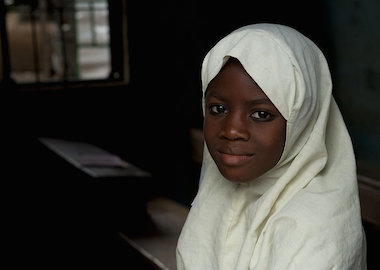Nearly 300 Nigerian schoolgirls have been ripped from their desks and chairs, notebooks and pencils, smiles and giggles and sent to hell. They’ve been sold, trafficked for sex and reproduction and household labor. Typically described as “forced” marriage, it would be more accurate to call it rape marriage. And, along with polygamy, rape-marriage is a form of biblical marriage despite being regularly overlooked by conservatives proclaiming their desire to return to biblical marriage. It’s evil but it also happens to be scriptural.
The practice of rape marriage occurs in many cultures and while it is sanctioned by scriptures it actually reflects the antiquated beliefs and practices of many cultures. Boko Haram, the Nigerian terrorist group (mis)uses the language of Islam in declaring forbidden—haram—all forms of western education. Its sole purpose, they claim, is to (re)turn to a state where their cultural and religious values, as they imagine them, are normative, according to their interpretation of Sharia.
In their gross misrepresentation of Islam Boko Haram has turned to a pre-Muslim, pre-Christian practice, that of human trafficking for rape-marriages. These terrorists target girls who are being freed from the shackles of illiteracy and sell them into sexual slavery, quasi-sanctioned by forms of marriage that don’t require the consent of the girl. (Boko Haram also sells girls into prostitution slavery to fund their sex and terror raids and uses them for sex and menial work in their military camps. For more on the lack of response to these repeated abductions and this last massive kidnapping see Anthea Butler’s commentary.)
The concept of rape marriage is not unique to these villains or their perversion of Islam. The Jewish and Christian scriptures have their own rape texts. (I have written previously about rape in the scriptures here, in The Africana Bible (Ruth), and in Mother Goose, Mother Jones, Mommie Dearest: Biblical Mothers and Their Children. And, at the bottom of this post is a video, starting at 31:05, of a lecture I gave on the topic.) The desire for biblical marriage is more than a reification of heteronormative marriage; it’s also a rejection of women’s sexual and reproductive autonomy. At its core, rape marriage reduces girls to objects for sale and barter to reproduce through torturous conditions, women who are compliant and accepting of their lot in life as household, sexual and reproductive slaves.
Forced illiteracy is key. Boko Haram is as threatened by the doodle-covered grammar books and primers of schoolgirls as American slaveowners were by letters scratched in the dirt by the women and men they claimed to own. Enslaved Africans in the Atlantic basin risked their lives, eyes, hands, feet, and tongues to read, as do girls and women all over the world. Literacy is life and liberation. There’s a war on women’s literacy and the combatants are targeting schoolgirls. Just ask Malala Yousafzai who, not coincidentally, has been vocal in her condemnation of the kidnappings.
The primary reason many if not most enslaved Africans held in bondage in American chattel slavery sought literacy was that they wanted to read the bible for themselves. They knew there were, in addition to slavery-affirming passages like “slaves obey your masters,” words of liberation in there. As the descendant of enslaved peoples, it’s my holy obligation to work for liberation in their names and in their memories. That work has led me to the scriptures of my faith which all too often are not liberating for me as a woman.
In my commentary on Ruth, I argue that “Religious authorities (bible translators, pastors, seminary professors) have been criminally negligent in exposing the ways in which the biblical narrative sanctions and contributes to the abuse of women in general, and wives in particular.” So we must tell the whole story about the treatment of women and biblical marriage, one which hardly resembles the rosy picture religious conservatives seek to invoke with that phrase.
We must tell the truth that the bible says that fathers can sell their daughters into sexual slavery (Ex 21:7)—given that enslaved women were used to breed slaves and for sexual gratification; there was no slavery for women in the bible that was not sexual slavery. (An argument can be made for the sexual abuse of male slaves as well.)
We must tell the truth that the bible says soldiers can take virgin girls home with them as the spoils of war (Num 31:17).
We must tell the truth that the bible says cut the nails off the woman you take home as your war prize (Deut 21:11)—making the rape easier on the rapist.
We must tell the truth that the bible says that Israelite identity does not protect women from wholesale rape as a tool of war; Judges 21:10-23 details repeated kidnappings of girls for rape marriage within Israel by other Israelites.
We must tell the truth that the bible says Ruth and Orpah were abducted into rape marriages just like the Nigerian schoolgirls. In Ruth 1:4, the verb used for their union is not the verb for marriage (l-q-ch) but the verb n-s-’, to “lift,” “abduct,” as in “throw her over your shoulder and run off with her.” It is the same verb used in the Judges text detailing the abduction and rape of the girls in Shiloh.
We must tell the truth that what is biblical is not always godly, holy or even right.
We must teach the bible’s Iron Age theology because it permeates our culture and society and we must reject that theology when it is death-dealing.
The objectification of women and girls as objects for rape and forced procreation is the manifestation of the rejection of their—our—humanity. It is older than the bible and the other scriptural texts it permeates. The scriptures are not the source of these ideas. Rejecting scripture or religion will not erase these treacherous ideologies from our midst. They permeate our culture in rape fantasies and the continued erosion and denial of the rights of girls and women to own and control our bodies. We must reject rape culture in all its forms, looking in all our houses, including houses of worship, sacred spaces and sacred texts.





